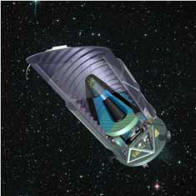

Friday - August 11, 2006
SLAC Today is
available online at:
http://today.slac.stanford.edu
In this issue:
NASA Funds SNAP Development
Panofsky Fellowships Return to the Lab
SCCS Offers New Way To Restore Your Files
 |
 |
|
Friday - August 11, 2006 |

NASA will support the SNAP mission concept for probing dark energy.
(Image courtesy of LBL.) NASA Funds SNAP DevelopmentSNAP, the SuperNova/Acceleration Probe, is now one step closer to becoming a reality. Earlier this month, NASA announced its support for an advanced mission concept study of the project. "There's a long way to go before SNAP becomes an official NASA mission," said KIPAC Assistant Director Steven Kahn. "But this is an important hurdle to have cleared." SNAP is an experiment designed to reveal the nature of dark energy by measuring the light from thousands of distant supernovae and observing hundreds of instances of gravitational lensing. Read more... |
||
|
|
||
Panofsky Fellowships Return to the Lab
The Panofsky Fellowship Program has appointed two new Fellows this year, including the first to research cosmology. Saurabh Jha, from U.C. Berkeley, joined the Kavli Institute for Particle Astrophysics and Cosmology (KIPAC) in June. Ariel Schwartzman, from Princeton, started at SLAC this month; he works on the European experiment ATLAS, which SLAC just joined. The SLAC faculty reviewed and redefined the program during a several-year hiatus. The five-year appointments, set up to honor SLAC founder Wolfgang "Pief" Panofsky, are equivalent to junior faculty positions. Fellows are selected to carry out SLAC research in experimental and theoretical particle physics, accelerator science, and now, particle astrophysics and cosmology. "They have all been very successful. They've always gone on to faculty positions or laboratory staff positions," said selection committee chair Rafe Schindler. Lance Dixon, a professor in SLAC's theory group, was the first Panofsky Fellow. Two other former fellows are also at SLAC: Associate Professor Tor Raubenheimer, head of International Linear Collider efforts at SLAC, and advanced accelerator R&D physicist Eric Colby. There have been six fellows since the program began in 1989. Candidates must be nominated by faculty or senior staff. Nominees are typically early in their research careers. This year's nomination package, including letters of support and a research proposal, is due Oct. 1. Typically, one Fellow is selected each year. |
SCCS Offers New Way To Restore Your FilesIt's late in the day, and suddenly the file you've been working on all afternoon becomes corrupted. Or maybe you accidentally saved another file over it. Have no fear! As long as you saved it to a network drive, you can restore the file quickly and painlessly. In the past, restoring files meant issuing a Help Track ticket and waiting for someone there to dig up a previous version of your file. Now, thanks to improvements in Microsoft software, SLAC employees and users can restore files themselves. "This new functionality makes file recovery faster and easier," said Brian Scott of the SLAC Windows Infrastructure Group. "We're very pleased to be able to offer this ability." To restore a file saved on the network drive, right click on the current version of the file and choose the Properties option. In the window that pops up, click on the Previous Versions tab. This will bring up a list of previous versions. Once you have determined which file to restore, highlight that file and click on either the Copy or Restore buttons. A full description of the process is available here. This only works for files saved to the network drive. The network drive is backed up three times a day, and each backup is saved for about a month. Anything older than one month will need to follow the current file restore process. There is no way to restore files saved to your desktop or hard drive. If you don't find the needed file through this process, you can still request a file restore through a Help Track ticket. "We hope the new method of file restoration will save you time," says Sean Sink of the SLAC Windows Infrastructure Group. "But if you have difficulty with the process, you can still feel free to contact the Help Desk." |
Events (see all | submit)
Access (see all)Announcements
|
| | ||
|
|
||
 <%
Response.AddHeader "Last-modified", getArticleDate()
'Response.AddHeader "Last-modified","Mon, 01 Sep 1997 01:03:33 GMT"
'Monday, December 06, 2010
%>
<%
Response.AddHeader "Last-modified", getArticleDate()
'Response.AddHeader "Last-modified","Mon, 01 Sep 1997 01:03:33 GMT"
'Monday, December 06, 2010
%>View online at http://today.slac.stanford.edu/. |
||